Earlier this year, Tony Freeth from Medusa Business, explained how to turn workspace visitors into members by having in place a wifi-onboarding process.
This week, Medusa Business published an ebook explaining the risks associated with anonymous guests using your workplace’s wifi; making the importance of wifi-onboarding an even more pressing matter.
You can read the full ebook here.
Below, we list 3 reasons why workspace operators should always ask their visitors to identify themselves and preferably also ask for an email address. Before diving into the reasons, let us just give you a quick intro to the Psychology of ‘Knowing You Are Known’.
When people are aware that others can know or find out what they’re doing, searching for, looking at, etc., chances are they will be on their ‘best behavior’ at all times. On the other hand, when people can do things anonymously, they are more likely to engage in ‘bad ‘behaviors. In extreme cases this can lead to illegal activity such as , stalking, trolling, the like.
This theory is supported when looking at Norway’s case of publishing every citizen’s tax returns. According to Norwegian tax authorities, the level of enquiries of other people’s tax returns dropped by 90% when they began forwarding the identity of the searcher to the subject of the search.
Taking the anonymity out of the equation, users began to moderate their own behavior. It gave them some sort of accountability, and the same can apply to people visiting your workspace.
Now, to the topic at hand: why you should ask for your guest’s identity and email.
1. For Marketing and Branding Purposes
Like Mr. Freeth explained in this article, asking visitors for their email means you can follow up with them about their experience and maybe offer some deals and coupons that’ll encourage them to visit you again. Additionally, Medusa’s ebook mentions that having a branded wifi gateway “accentuates the sense of place, and entering an identity is part of the user journey as they join your club.” Which can help visitors identify themselves with your workspace.
2. Protection of Your Brand’s Reputation and Your Member’s Information
Unfortunately, your network’s name can be impersonated by someone with the wrong intentions. According to Medusa Business, people can setup a Wifi network with the same name as yours and use it to attack guests or lead them on by mistake. By doing this, criminals can proceed to scan user data and attack devices looking for anything useful or tempt users to visit phishing sites.
3. To Discourage People From Engaging in Criminal Behavior
If people have free and anonymous access to your wifi, they might engage in questionable or criminal activities, like downloading illegal content or online trolling. Ideally, this will never happen, but if it does, the authorities might request your workspace to identify the user and the device that was used. Asking for a person’s identity and email can help you have your back covered and prevent authorities from having to take away your IT systems for evidence (depending on your country’s laws).
The probability of running into a person that would use your workspace wifi for criminal and questionable activity is likely slim, but it’s always good to be prepared. Keep in mind that when you ask a person to identify themselves, you also have accountability and need to protect their information and data.
For this reason, it’s important that you, as a workspace operator, have a clear document outlining your terms and conditions, where the relationship between your workspace and its visitors is clearly defined and also outlining what each party is responsible for.



 Dr. Gleb Tsipursky – The Office Whisperer
Dr. Gleb Tsipursky – The Office Whisperer Nirit Cohen – WorkFutures
Nirit Cohen – WorkFutures Angela Howard – Culture Expert
Angela Howard – Culture Expert Drew Jones – Design & Innovation
Drew Jones – Design & Innovation Jonathan Price – CRE & Flex Expert
Jonathan Price – CRE & Flex Expert











